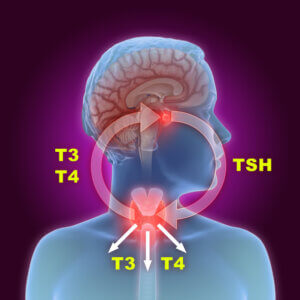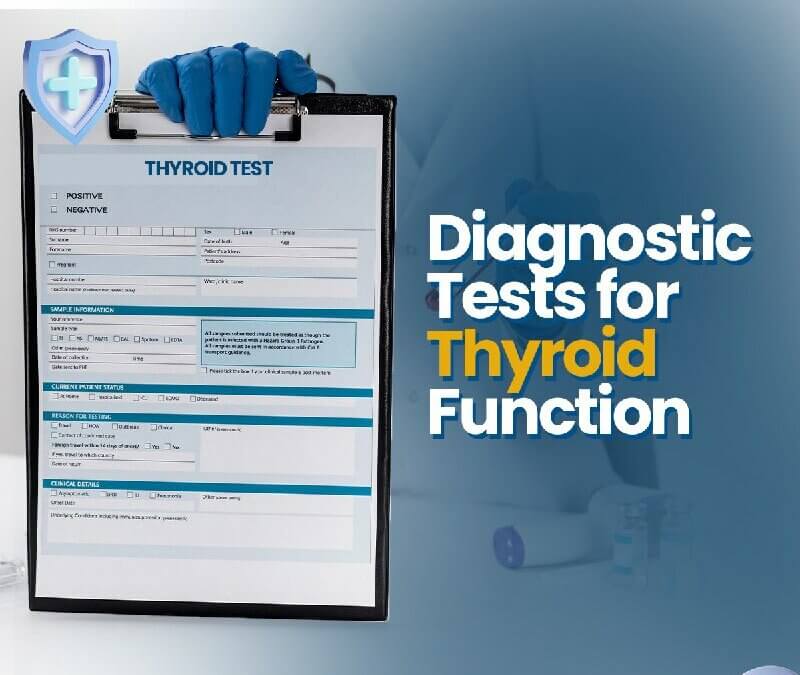Share this blog post with your friends
Doctors utilise thyroid function tests to assess how effectively your thyroid gland is working as we’ve explained. These tests enable them to ascertain whether your thyroid is functioning regularly or not. In addition to Triiodothyronine (T3) and Thyroxine (T4), which we have thoroughly examined, let’s take a closer look at important tests that doctors use to evaluate thyroid function:
1. Thyroid-Stimulating Hormone (TSH)
TSH, which stands for Thyroid-Stimulating Hormone, is a hormone produced by a small gland in your brain called the pituitary gland. The primary function of TSH is to communicate with your thyroid gland. TSH acts like a messenger, sending signals to the thyroid gland to produce and release two key hormones known as triiodothyronine (T3) and thyroxine (T4).

3D illustration of the thyroid gland and pituitary gland part of the endocrine system
When your body needs more thyroid hormones, the pituitary gland releases more TSH, which stimulates the thyroid gland to produce and release T3 and T4 into the bloodstream.
On the other hand, if there is an excess of thyroid hormones in your body, the pituitary gland senses this and reduces the production of TSH to signal the thyroid gland to slow down its hormone production. This feedback loop helps maintain a delicate balance of thyroid hormones in your body.
TSH levels that are elevated frequently suggest hypothyroidism, whereas low TSH levels can indicate hyperthyroidism. The TSH level is critical in determining the thyroid gland’s overall function.
2. Free T3 and Free T4
The active and unbound versions of the thyroid hormones T3 and T4 are referred to as Free T3 and Free T4. These hormones have the ability to alter numerous regions of your body.
The term “free” refers to the fact that these hormones are not attached to proteins in the circulation. Instead, they are ready to engage with cells and tissues all across your body. T3 and T4 can exert their effects on various systems and organs since they are free and unbound.
Measuring Free T3 and Free T4 levels through blood tests provides valuable information about the actual amount of active thyroid hormones circulating in your bloodstream. This helps healthcare professionals assess your thyroid function more accurately and identify any imbalances or abnormalities.
Abnormalities in these levels can provide information about thyroid function and aid in the diagnosis of specific thyroid illnesses.
3. Thyroid Antibodies
Specific antibodies can provide useful insights into autoimmune thyroid disorders when it comes to thyroid health. Thyroid peroxidase antibodies (TPO antibodies) and thyroglobulin antibodies (TG antibodies) are two typical types of antibodies examined. These antibodies aid in the diagnosis of illnesses such as Hashimoto’s thyroiditis and Graves’ disease, which are characterised by an overactive or underactive thyroid as a result of the body’s immune system attacking the thyroid gland. Testing for these antibodies can help healthcare providers make an accurate diagnosis and determine the best treatment options for certain autoimmune thyroid disorders.
Positive results for thyroid antibodies, such as TPO antibodies or TG antibodies, indicate autoimmune thyroid conditions like Hashimoto’s thyroiditis or Graves’ disease.
3. Reverse T3 (rT3)
This is a less active form of the thyroid hormone T3. While T3 regulates metabolism and other critical activities, increased rT3 levels can indicate an imbalance in thyroid hormone metabolism. This can happen under particular circumstances, such as persistent stress or sickness, when the body converts more T4 (inactive form) into rT3 rather than active T3. Monitoring rT3 levels can provide useful information about thyroid function and assist healthcare providers in identifying underlying disorders influencing thyroid hormone balance.
It is critical to speak with a healthcare professional to appropriately interpret these test findings. They will use the results, together with clinical symptoms, medical history, and other criteria, to identify the best diagnosis and treatment approach for each individual.
Importance of Thyroid Function for Overall Health
Understanding the significance of thyroid function is critical for general health and well-being. Let’s look at why your thyroid is so important and how treating thyroid issues can benefit your health.
- Thyroid hormones regulate metabolism, which determines how efficiently your body burns calories for energy. A thyroid that is underactive (hypothyroidism) can induce weight gain, weariness, and sluggishness, whereas a thyroid that is overactive (hyperthyroidism) can cause weight loss, restlessness, and a high heart rate.
- Thyroid hormones have an impact on your heart rate, blood pressure, and cholesterol levels. Thyroid dysfunction can lead to excessive blood pressure, irregular heart rhythms, and abnormal cholesterol levels.
- Thyroid hormones are required for brain development and the maintenance of normal brain function. Brain fog, mood swings, memory issues, and difficulty concentrating are all indications of thyroid dysfunction.
- Thyroid hormones play a role in the regulation of menstrual cycles, fertility, and sexual function. Imbalances in these processes can cause irregular periods, reproductive problems, and sexual dysfunction.
Thyroid diseases, fortunately, can be effectively treated with adequate therapy and monitoring. Here’s what you can do:
- Medications: Your healthcare practitioner may recommend medicine to restore hormone balance and ease symptoms, depending on your unique condition.
- Changes in Lifestyle: Adopting a healthy lifestyle can help your thyroid function. A balanced diet, frequent physical activity, stress management, and proper sleep are all beneficial.
- Regular Check-Ups: It is critical to schedule regular follow-up consultations with your healthcare professional in order to check your thyroid function. They will perform blood tests on a regular basis to check hormone levels and change your treatment strategy as needed.
Final Thought
We’ve learned that the thyroid gland regulates a variety of body activities throughout this article. Thyroid hormones have an impact on metabolism, cardiovascular health, the central nervous system, and reproduction. Thyroid function imbalances can result in hypothyroidism or hyperthyroidism, both of which have specific symptoms and treatment options. TSH, T3, T4, thyroid antibodies, and reverse T3 are all diagnostic tests that assist in examining thyroid function and detect any abnormalities.
Thyroid issues are managed by medicine, lifestyle adjustments, and regular monitoring. You can boost your energy levels, manage your weight, improve your heart health, and improve your general well-being by taking charge of your thyroid health.
Don’t hesitate to reach out to us at SYNLAB if you suspect a thyroid issue or have questions. Your health is vital, and obtaining timely medical guidance will ensure good thyroid health management. Remember that only a certified medical practitioner can provide complete advice tailored to your specific situation

